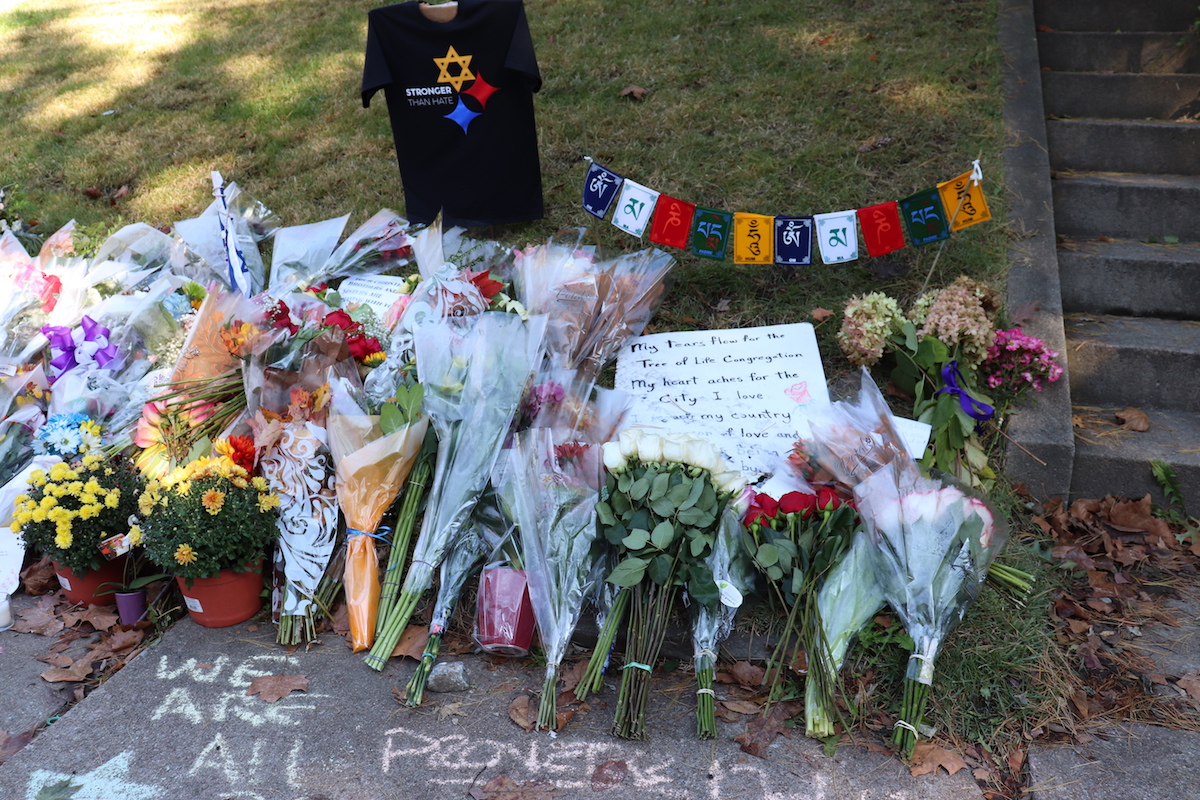The messages were overwhelming. I was bombarded with “where are you?” before I even knew what happened. Once I found out, my emotions overtook my body: I felt like my skin was burning and peeling off my bones, so I scratched myself until my skin turned red. I was nauseous and hungry at the same time. I was choking on my own grief, and pulling my own hair. Even after the shooter was apprehended, I was too buried in my own self-destruction to even care.
It has been four days since the horrific tragedy at Tree of Life synagogue. As a Jewish student at the University of Pittsburgh, these feelings have become a dull throb in the front of my head. I have been going to class. I have been answering emails. But I’ve also had difficulty sleeping; I keep waking up in the middle of the night frightened, but unsure what of.
It’s not getting better. But it seems so many others have moved on.
I walk around campus, here in Pittsburgh, and see people laughing and going back to normal. It hurts. It seems like a secret between the Jewish students as we exchange, “How are you doing today?” and grim looks: We aren’t safe here.
I am no stranger to anti-Semitism. I remember girls joking about “How many Jews can you fit in an ashtray” when I was growing up, and my local JCC was painted with Nazi imagery just a few weeks ago. I have buried my pessimism for a long time. I was taught to love those unlike us — but I always felt that history would repeat itself. Until this weekend, I have done my utmost to suppress that dark side of my consciousness, the one that whispered that the world would always hate Jews.
Since the shooting, I have spent all my spare time in exclusively Jewish spaces, taking part in the Jewish student response to this crisis. We all seem to share a disappointment in the way our Pitt community has responded.
Students, staff, and faculty received emails of condolence from the Dean (Saturday afternoon) and Chancellor (Monday afternoon). Between these two e-mails, there was just one single mention of anti-Semitism, zero messages of concern or mentions of Jewish students, and an offering of two additional hours of counseling services on two different days. Four extra hours for 1,600 Jewish undergrads and hundreds more Jewish grad students over the weekend — hours that conflicted with Jewish-sponsored mourning activities and vigils. The Dean and other administrators visited Chabad and Hillel, which is fantastic, but I found out belatedly; their visit wasn’t advertised well enough to students so that we could voice our grievances. While I am positive their intentions are in the right place, it’s hard to feel supported.
Professors and TAs sent assignment updates to me mere hours after the tragedy, seemingly unaware of what had happened. And yes, they’ve given extensions and offerings of kindness, but not much else.
The worst part, for me, is the other students. People asking “how are you?” and not waiting for a response (or hoping for a curt answer). Non-Jewish students on Facebook who add #TogetherAgainstAntisemitsm to their profile pic and do nothing else. This is performative allyship and it hurts.
And then there are those who marked themselves “safe” in the shooting on Facebook who are neither Jews, nor residents of Squirrel Hill. Those who tell me how unsafe they feel, who are not Jewish. This makes this very Jewish crisis not about those who lost their lives or the Jewish community, but about them.
Students at Hillel, along with myself, have expressed to the greater Pitt community that we need them to let us grieve and pick up our gauntlet so we don’t have to do it ourselves. But here we are, unheard, as Jewish students grieving and fighting to be seen, struggling to prevent Jewish erasure from a Jewish crisis, all while our friends post pictures of sexy Halloween costumes and seem surprised about how affected we are.
I want my community to better themselves in the aftermath of this tragedy. I want them to learn to stop anti-Semitism in all its forms: coerced assimilation, micro-aggressions, damaging stereotypes, graffiti, hate speech, or mass murder. Refuse platforms to white supremacists online or otherwise. Mourn our dead — as well as Maurice E. Stallard and Vickie Lee Jones, the two black Americans killed by a white supremacist earlier in the week, whose stories have been buried. And please, don’t use our crisis as a way to talk about the Israel-Palestine conflict, as if that has anything to do with what’s going on here.
I do want to acknowledge those who did it right: The good cops and the friends and professors, both Jewish and non-Jewish, who have reached out to me and let me know that I am worthy of protection. You are the “helpers” that Mr. Rogers reminds us to look for. You are the reason I’m not totally falling apart.
Header Image by Hane Grace Yagel.



